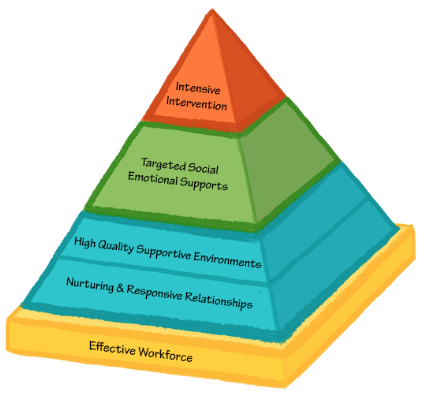23 ECE Pyramid Model in Nova Scotia
What is the Pyramid Model?

The Pyramid Model is a conceptual framework of evidence-based practices for promoting young children’s healthy social and emotional development.[1] The Pyramid Model program uses a coaching model to provide guidance to families, Early Childhood Educators and other professionals and builds upon a tiered approach to providing universal supports to all children to promote wellness, targeted services to those who need more support, and intensive services to those who need them.[2]
Effective Workforce[3]
The foundation of the Pyramid Model is a trained, effective workforce. This ensures that systems and policies are in place to support those working with young children by providing ongoing training and support to implement the Pyramid Model practices.
1.High Quality Supportive Environments Nurturing & Responsive Relationships
This tier supports all children by providing nurturing and responsive relationships in safe and supportive environments.
2.Targeted Social and Emotional Supports
This tier supports some children who are at risk of challenging behaviours by teaching them targeted social and emotional supports such as how to identify and express emotions, develop problem-solving skills, and playing cooperatively with other children.
3. Intensive Intervention
This tier supports the few children who may require individualized and intensive supports which include planning with families to meet their needs and develop skills for understanding and responding to challenging behaviours.
What are the benefits of Pyramid Model practices?
Benefits for Children
Enhances their social skill an emotional skills which include their ability to:
- Develop and maintain friendships
- Identify and manage emotions
- Use problem-solving skills
- Follow directions
- Share and take turns
- Understand routines and transitions
- Develop self control strategies
Benefits for Educators
- Creates positive, supportive relationships with children
- Coaching and support for learning and implementing new strategies
- Provides training to support families
- Provides them with resources to share with families
Benefits for Families
- Creates positive, supportive relationships with children
- Provides resources and tips to promote social and emotional skills at home
- Helps build partnerships between families an educators to support capacity in preventing and addressing challenging behaviours
Pyramid Model in Nova Scotia[4]
Vision
All Nova Scotia (NS) ECEs and their programs have the capacity to support the social emotional well-being of children and their families in collaboration with a caring network of community partners.
Mission
To lead the development of a sustainable infrastructure to implement the Pyramid Model, a system of professional development practices for ECEs, that address the social emotional needs of NS children and their families.
Why implement Pyramid Model in Nova Scotia?
In a 2017 report (using data from 2012-13 & 2014-15), children in NS were reported to be amongst the most vulnerable nation-wide in at least one area of their development, including their social competence domain and emotional domain.[5] In response to this data, the province decided to implement the Pyramid Model in Regulated Childcare Centres (RCCs) and Pre-primary Programs (PPPs) to support educators working with young children and their families to develop and enhance their social and emotional development.
How is Pyramid Model implemented in Nova Scotia?
Who is involved in the Pyramid Model implementation in Nova Scotia?
The foundation of the Pyramid Model is data-based decision making, which means using practical information and experiences to inform decision making and future implementation. The Pyramid Model uses a coaching approach to professional development where Inclusion Coaches directly support ECEs in their implementation of Pyramid Model practices.
The program is implemented by Nova Scotia Early Childhood Development Intervention Services (NSECDIS) through 28 service locations. NSECDIS is a province-wide provincially funded program which provides specialized services and supports to families of young children from birth to school entry who are experiencing delays or difficulties in their development.
Who is involved in the Pyramid Model implementation in Nova Scotia?
There are key persons and various roles involved in the Pyramid Model implementation. Collaboration and positive relationship building are key for the implementation’s success.
Attribution
This unit is adapted from 2 resources:
The National Center for Pyramid Model Innovations (NCPMI). (n.d.) Pyramid model overview. https://challengingbehavior.cbcs.usf.edu/Pyramid/overview/index.html
NSECDIS and Early Childhood Collaborative Research Centre. (2021, June). The pyramid model in Nova Scotia. MSVU. https://www.msvu.ca/wp-content/uploads/2021/02/Pyramid-Model-Introduction-Infographic-Final-English.pdf
- NCPMI. (n.d.) Pyramid model overview: The basics. https://challengingbehavior.cbcs.usf.edu/Pyramid/overview/index.html ↵
- Ibid ↵
- NCPMI. (n.d.) Pyramid model overview: Tiers of the pyramid model. https://challengingbehavior.cbcs.usf.edu/Pyramid/overview/index.html ↵
- NSECDIS and Early Childhood Collaborative Research Centre. (2021, June). The pyramid model in Nova Scotia. MSVU. https://www.msvu.ca/wp-content/uploads/2021/02/Pyramid-Model-Introduction-Infographic-Final-English.pdf ↵
- Nova Scotia Department of Education and Early Childhood Development. (2018). Accountability Report 2017–2018. https://novascotia.ca/government/accountability/2017-2018/2017-2018-Department-of-Education-and-Early-Childhood-Developmen-Accountability-Report.pdf ↵

